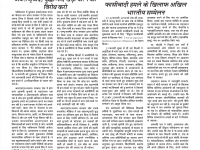The General Council of All India Kisan Mazdoor Sabha (AIKMS) began in Berhampur on July 30, 2019. Nearly one hundred fifty delegates are participating in the General Council. In the Inaugural session besides delegates a number of guests also participated. Before the Council meeting inauguration, flag of AIKMS was hoisted.
In the beginning, senior advocate Bhagwan Sahu, chairman of the reception committee welcomed the delegates by presenting narratives of struggles of landless kisans in Ganjam district where the event was taking place. A number of farmers had attained martyrdom in their struggles for land in Ganjam/Berhampur area. Death has never deterred them from sustaining the struggle though the crisis today has depended further.
Dr. Golak Bihari Nath– noted pro-people economist and chief guest of the session, while presenting a historical perspective on agrarian issues starting from the post independence period, through green revolution, WTO regime and the economic reforms of 1990s, called for the following:
- Land is a political question
- Agrarian crisis is also a political crisis, but it is being addressed through non political interventions such as Kalia (Odisha), Royatu Bandhu (Telengana) or PM Kisan (Centre).
- Instead of addressing structural issues affecting the farm sectors, the government has gone for technological changes. As a consequence, Green Revolution was introduced in India that created miseries for famers-leading to large scale suicides.
- Farmers have protested and are protesting immaterial of the results they yield.
- But what we need today is a coordinated effort of all peasant organizations.
- He said, Marxist –Leninist lines of thoughts can only provide the answers to sustain the struggles with commitment.
- He reminded the delegated by interpreting Marx’s famous appeal that the peasants across the country should unite as they have nothing more to lose.
Samdrushti Editor Sudhir Pattnaik also addressed the delegates for brief and added the following points:
- De-politicization of agrarian issues by itself is a political act, which is disempowering peasantry by making them dole dependent.
- Technological changes further upset structural issues by widening inequality since those who had access to capital, they only could benefit.
- One should not give up struggle for land, as land has been targeted by big players across the globe. Once corporate entities acquire land, its values increases hundred to 5 hundred times, as it has been seen in Kalingnagar and elsewhere. Thus under valuing one’s own land strengthens the corporate agenda for maximizing their value once it comes to their possession and the perpetuation of destitution among peasantry continues.
- Again, those who own small and marginal land holding are not the real owners of land, as they become slave to the market and financial institutions; starting from buying seeds, fertilizers, chemical pesticides to that of availing machines, tractors , harvesters etc. market decides their choices and options. Here transfer of land to tiller does not provide effective ownership as market and money control everything.
After the conclusion of the Inaugural Session, the General Council meeting commenced. Report is awaited.
